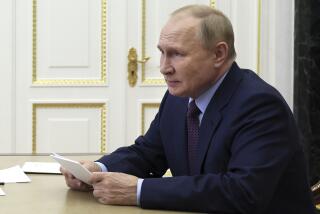CIA Authorized to Target Hussein : Iraq: The Administration earmarks $30 million for covert action to weaken or oust the dictator. Officials call it an escalation of earlier moves--not a new effort.
- Share via
WASHINGTON — The Bush Administration has authorized the Central Intelligence Agency to undertake covert action designed to weaken or topple Iraq’s Saddam Hussein, and it has set aside an estimated $30 million for the program, sources said Friday.
The Administration in the last several weeks has notified the intelligence committees of Congress of the new anti-Hussein activities, which include propaganda broadcasts and expanded contacts with opposition figures in Iraq.
The new moves were inspired in part by reports from Baghdad within the last 10 days of the first major cracks in support for Hussein among members of the ruling Sunni Muslim elite.
Senior officials said the latest intelligence authorization, called a “finding,” does not represent a major new effort to oust Hussein but rather a deliberate escalation of previous actions designed to keep the pressure on Baghdad.
“Of course we’d like to see Saddam out of there, and we talk to people in the region about the situation there,” one knowledgeable Administration source said. But he cautioned, “I wouldn’t get too carried away on the specifics of active programs.”
The $30 million authorized for the program comes from a special CIA contingency fund for covert operations and does not require separate congressional approval.
The readiness of Administration officials to confirm a normally top-secret intelligence finding indicates that the program may be as much a psychological warfare effort to encourage anti-Hussein opposition and to keep Hussein off balance as the beginnings of a major covert operation.
Although eager to strengthen and embolden opposition in Iraq, American officials remain wary of direct military action or other unilateral steps against Hussein, finding the risks of failure or damaging side effects prohibitive.
Knowledgeable officials also said that, despite signs of some defections among the ruling Sunni clique, Hussein is not now in any danger of being toppled from within.
“We’re seeing some cracks in the Sunni community,” one official said, “but we’ve misread (the signals) so many times that we’re hesitant to overreact.”
The moves come at time when CIA Director Robert M. Gates is in the Middle East to talk to local agency operatives and allied officials about the situation in Iraq and elsewhere in the region. Gates reportedly plans to visit Egypt, Israel and Saudi Arabia.
The CIA, in a rare confirmation of the director’s travels, acknowledged that Gates is out of the country but said the trip was a previously planned journey “to exchange views on intelligence-related matters of mutual concern” with his counterparts in friendly foreign countries.
Officials in the Administration and on Capitol Hill were reluctant to discuss the new finding in detail, but said that it represents a continuation of moves that have been adopted since the ambiguous conclusion of the war against Iraq last March.
The policy does not include direct military aid to either Shiite Muslim rebels in the south of Iraq or Kurdish separatists in the north, officials said.
Both groups attempted to overthrow Hussein’s regime at the end of the Persian Gulf War; the rebellions were savagely crushed by Iraqi Republican Guard divisions that escaped the allied air and ground campaign.
Administration officials have had numerous public and private contacts with representatives of both groups but have made no pledges of aid.
“You know that we have had a whole series of meetings and discussions here with Iraqi opposition figures. I haven’t gotten any recent updates, but I expect that those continue,” State Department spokesman Richard Boucher said Friday.
While Kurdish and Shiite leaders have pleaded for U.S. military backing for their rebellions, the Administration has been reluctant to provide it for fear of dismembering the country.
Officials have said they want Hussein overthrown and replaced by a more moderate and friendly leader. They do not want another Lebanon, torn by competing ethnic armies, astride some of the world’s richest oil fields.
U.S. military and intelligence officials believe that the best hope for a successful coup lies within the Republican Guard or in the small circle of minority Sunnis who form the core of the Arab Baath Socialist Party and the Baghdad government. Efforts to penetrate this group have so far been unsuccessful, sources said, but the CIA continues to try.
The finding also arose from a recent review of the Administration’s Iraq policy, which concluded that the CIA should step up its covert activities in the country to exploit any cracks in the regime. The National Security Council also instructed the Pentagon to prepare contingency plans to support any military-led coup attempt against Hussein.
The top Pentagon brass, led by Gen. Colin L. Powell, chairman of the Joint Chiefs of Staff, has argued against new military action against Iraq, saying that to be successful it would have to be massive.
Times staff writers Michael Ross and James Gerstenzang contributed to this report.
More to Read
Sign up for Essential California
The most important California stories and recommendations in your inbox every morning.
You may occasionally receive promotional content from the Los Angeles Times.













